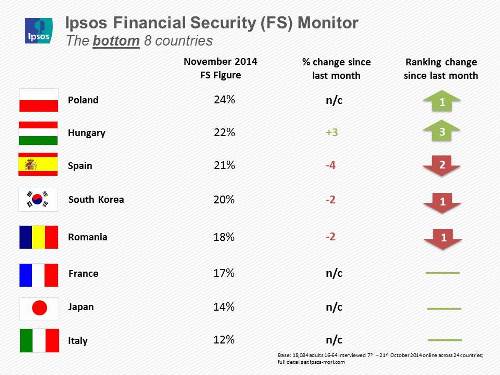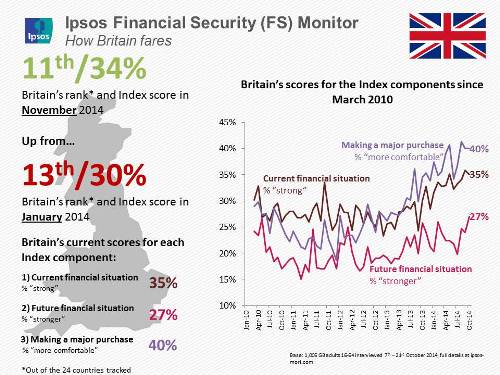Europeans remain financially insecure as Britons hold steady
Ipsos' latest Financial Security Monitor, a monthly survey carried out across 24 countries around individuals' financial security, shows European countries continuing to feel relatively financially insecure - six out of the eight bottom countries in our FS Monitor are EU member states.

- After last month’s slight rebound, China’s figure has slipped back (perhaps reflecting the recent slowing in GDP) with the Chinese feeling noticeably less confident in their current financial situation and less comfortable about making a major purchase. The country’s FS Monitor figure is down five points this month and has moved closer to its longer term average.
- Germany’s Monitor figure is down five points this month: recent mixed economic data seems to be feeding into Germans’ feelings of financial security. As a result, the country has slipped three places in the rankings (from 9th to 12th overall).
- Great Britain’s Monitor figure is holding steady at 34% (up one point from October). This is a slow improvement since January 2014 (GB’s figure is up four points from 30% since then). Due to the slippage in Germany’s figure, it is now 2nd out of the EU countries we track. Of the EU countries, only Sweden now records a higher number. Britain is now 11th overall.

What is the Ipsos Financial Security Monitor?
Each month we ask citizens of 24 countries about their financial situation. We ask three questions covering:
- The present: Their current financial situation.
- Direction of travel: How comfortable people feel making a major purchase compared with six months ago.
- The future: Their expectations for their financial situation 6 months from now.
The Ipsos Financial Security Monitor is a mean of:
- % saying current financial situation is strong.
- % feeling more comfortable making a major purchase.
- % who saying their future financial situation will be stronger 6 months from now.
Simon Atkinson, Assistant Chief Executive at Ipsos, said:
"It’s rare for a pollster to be able to report that Britain is ahead of Germany on measures around economic confidence. But that’s exactly where we are today. The improvements over the last couple of years are bordering on the remarkable. In the wake of the Autumn Statement, George Osborne will be quietly pleased with these results."
Downloads
Technical note
The Ipsos Financial Security Monitor is an average taken from responses to three questions from Ipsos’ Global Advisor omnibus. These questions are:
- B8-“Rate your current financial situation, using a scale from 1 to 7, where 7 means your personal financial situation is very strong today and 1 means it is very weak.”
- B9-“Looking ahead six months from now, do you expect your personal financial situation to be much stronger, somewhat stronger, about the same, somewhat weaker, or much weaker than it is now?”
- B10-“Compared to 6 months ago, are you NOW more or less comfortable making a major purchase, like a home or car?”
The figures used to calculate this average is the percentage of people who answer in the affirmative (i.e. “strong”, “stronger” and “more comfortable”) to each of the above questions. As two (B8 & B9) of these questions are based on scales, those respondents who answer at or near the top of the scale are included in these groups. E.g. 7 is the top point on B8’s scale. All respondents who placed their answers at points 5, 6 or 7 on B8’s scale would be included in the “strong” category, and thus the Index average. Ipsos Global Advisor is a monthly survey conducted in 24 countries around the World via the Ipsos Online Panel system. The countries’ data which form this report are Argentina, Australia, Belgium, Brazil, Canada, China, France, Great Britain, Germany, Hungary, India, Italy, Japan, Mexico, Poland, Romania, Russia, Saudi Arabia, South Africa, South Korea, Spain, Sweden, Turkey and the United States of America.
Between 7th and 21st October, an international sample of 18,084 adults aged 18-64 in the USA and Canada, and aged 16-64 in all other countries, was interviewed. Approximately 1,000 individuals participated in the survey from each country, with the exceptions of Argentina, Belgium, Hungary, Mexico, Poland, Romania, Saudi Arabia, South Africa, South Korea, Sweden and Turkey, where each has a sample of c.500 individuals.
All data are weighted so as to balance demographics and to ensure that the sample’s composition reflects that of the adult population according to the most recent country Census data.



